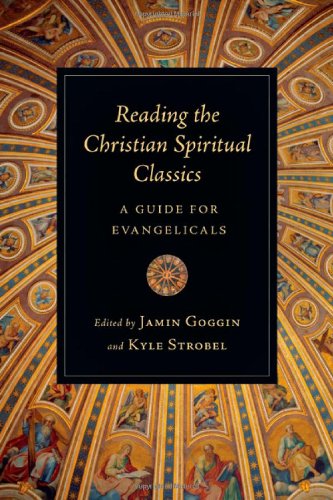Reviewed by J. Stephen Yuille
Introduction
There’s growing interest among evangelicals in the subject of spirituality. One of the problems with this trend, however, is that most of the Christian spiritual classics weren’t written by evangelicals. This leads to several potentially perplexing questions. Should evangelicals read the classics? How should they read them? Why should they read them? In an attempt to answer these questions, Jamin Goggin and Kyle Strobel have produced Reading the Christian Spiritual Classics. Their aim is to develop “a robust hermeneutic grounded in markedly evangelical spiritual and theological commitments,” which will serve to equip evangelicals to engage the Christian spiritual classics. With that end in view, Goggin and Strobel have gathered and organized fourteen essays (from various scholars) around four main themes.
Summary
Approaching Spiritual Classics
The aim of this section is apologetic; that is, it seeks to provide a defense for reading the classics. It includes chapters by Steve Porter, “Why Should We Read Spiritual Classics”; John Coe, “Temptations in Reading Spiritual Classics”; and Betsy Barber, “The Value of Spiritual Classics in Soul Care.”
The authors make the point that we read the classics for the purpose of spiritual transformation. There’s something to be gained from engaging the body of Christ across the centuries and reflecting upon contextualized examples of what it means to live out the Christian faith.
The Spiritual Classics Tradition
The aim of this section is to provide an overview of the various movements within Christian spirituality. It includes chapters by Evan Howard, “The Schools of Christian Spirituality”; Greg Peters, “Spiritual Theology: A Historical Overview”; and James Houston, “Engaging Classic Literature: Genre, Use, Value.”
The authors provide a helpful introduction to the different approaches to Christian spirituality. What is the difference between the Dominican and Benedictine schools? What are the distinguishing features of Celtic spirituality? How is Anglican spirituality expressed in the Book of Common Prayer? What are the differences/similarities between Lutheran/Pietist spirituality and Reformed/Puritan spirituality? Who was Ignatius, and why are his Spiritual Exercises so important? This section answers these (and many other) questions.
Reading Evangelically
The aim of this section is to provide a framework for reading the classics from an evangelical perspective. It includes chapters by Bruce Demarest, “Reading Catholic Spirituality”; James Payton Jr., “Reading Orthodox Spirituality”; and Fred Sanders, “Reading Spiritual Classics as Evangelical Protestants.”
The authors offer guidance to evangelicals who desire to benefit from the classics while avoiding some of the potential pitfalls. Fred Sanders’ chapter is particularly helpful. He argues for an “open but cautious” approach to non-evangelical spirituality; that is to say, we must not uncritically accept Catholic or Orthodox spirituality, because both traditions hold to doctrinal views that depart from evangelical theology. We can’t simply sidestep substantial matters dealing with faith and truth; e.g., the authority of Scripture, the nature of sin, the meaning of justification, the role of Mary, the invocation of saints, the role of mysticism, etc. Therefore, when we read the Christian spiritual classics (especially those works that fall outside the evangelical tradition), we need a well-developed set of theological categories, so that we can discriminate between what is helpful and harmful.
How to Read the Spiritual Classics
The aim of this section is to establish hermeneutical tools for reading the different schools of spirituality. It includes five chapters: Michael Glerup, “The Church Fathers and Mothers”; Gerald Sittser, “The Desert Fathers”; Greg Peters, “The Medieval Traditions”; Timothy George, “The Reformation Traditions”; and Tom Schwanda, “The Puritan and Pietistic Traditions.”
The authors provide suggestions for evangelicals who desire to interact with classics from one of these schools of spirituality: church fathers, desert fathers, medieval theologians, reformers, puritans, and pietists. For those unfamiliar with anything pre-Reformation, the first three chapters will function as helpful primers.
Evaluation
For those seeking to broaden their understanding of Christian spirituality, the present volume will prove a worthwhile read. It provides a helpful overview of the different approaches to Christian spirituality, a critical analysis of these approaches from an evangelical perspective, and an insightful study of what it means to read the Christian spiritual classics both critically and profitably.
Dr. J. Stephen Yuille is Pastor of Grace Community Church, Glen Rose, TX, Associate Professor of Biblical Spirituality, The Southern Baptist Theological Seminary, Louisville, KY, and Book Review Editor for Spirituality and Christian Living at Books at a Glance.
